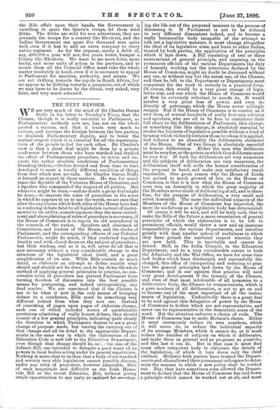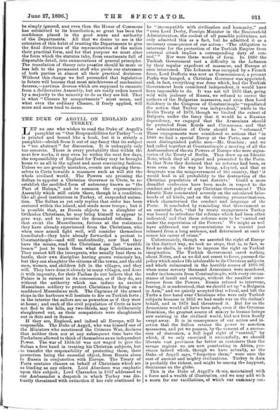THE NEXT REFORM.
WE are very much of the mind of Sir Charles Gavan Duffy in his letter to Tuesday's Times, that the Closure, though it is really essential to Parliament, as Parliamentary methods now are, has not on the whole proved a success, and that it tends very much to irritate, and increase the friction between the two parties, to diminish Parliamentary dignity, and to lower the mutual respect which it is essential for all the representa- tives of the people to feel for each other. Sir Charles's view is that a great deal might be done by a private conference between those who have watched and studied the effect of Parliamentary procedure, to revise and im- prove the rather obsolete conditions of Parliamentary Standing Orders,—Orders devised and from time to time developed to meet a totally different condition of things from that which now prevails. Sir Charles Gavan Duffy is himself an expert in these matters. He was for many years the Speaker of the Victorian House of Commons, and a Speaker who commanded the respect of all parties. But whatever might be done,—and no doubt a great deal might be done,—to improve the rules of procedure in the sense in which he appears to us to use the words, we are sure that after the experience which both sides of the House have had in rendering debate fatal to all legislation instead of instru- mental to its utility, something more than the mere curtail- ment and strengthening of rules of procedure is necessary, if the House of Commons is to regain its old ascendency in the counsels of the nation. Speakers and chairmen of Committees, and leaders of the House, and the clerks of Parliament, and the corresponding officers of our Colonial Parliaments, might do much, if they conferred together frankly and with closed doors on the subject of procedure ; but their wisdom, real as it is, will never do all that is now necessary without a very considerable change in the structure of the legislative ideal itself, and a great simplification of its aim. While Bills contain so much detail, so elaborate an attempt to define exactly what should and should not be done, and to lay down the whole method of applying general principles to practice, no con- ceivable rules of procedure can prevent Parliament from turning freedom of discussion into the best possible means for postponing, and indeed extinguishing, any final resolve. We are convinced that if the Closure is not to be what it now is, the only means of bringing debate to a conclusion, Bills must be something very different indeed from what they now are. Instead of consisting of pages upon pages of elaborate clauses, each one of which includes scores of questionable provisions admitting of really honest debate, they should consist of a few general principles, indicating quite clearly the direction in which Parliament desires to see a great change of purpose made, but leaving the carrying out of that change and all its detail to the appropriate Depart- ments in the same way in which the elaboration of the Education Code is now left to the Education Department, even though that change should be, as i the case of the defunct Bill, one intended to delegate a good many 'of its powers to local bodies acting under its general supervision. Nothing is more clear to us than that a body of six hundred and seventy very able legislators cannot possibly discuss, under any rules of procedure, however admirable, Bills of such magnitude and difficulty as the Irish Home- rule Bill or the recent Educatics; Bill, without giving ample opportunities to any party so inelinssi fax ssisather- ing the life out of the proposed measure in the process of discussing it. If Parliament is not to be reduced to very different dimensions indeed, and to become a really businesslike body incapable of the attempt to talk out a legislative measure, it must change altogether the ideal of its legislative aims, and leave to other bodies, trusted by both parties, the application of the principles which it lays down. A Bill consisting of two or three enunciations of general principle, and imposing on the permanent officials of the various Departments the duty of honestly working out the intentions declared by the House of Commons, might no doubt be discussed without any use, or without any but the rarest nee, of the Closure, and then be left to the Department or Departments most competent for the work to embody in a practical form. Of course, this would be a very great change of legis- lative aim, and one which the House of Commons would at first be extremely reluctant to accede to. It would involve a very great loss of power, and even in- directly of patronage, which the House never willingly resigns. But if the House of Commons is to consist, as it now does, of several hundreds of really first-rate advisers and speakers, who are all to be free to contribute their full share to the deliberations of Parliament, this change, or something like this change, is absolutely essential to render the business of legislation possible without a kind of tyranny which violently irritates those to whom it is applied, and reduces to an absurdity the deliberative character of the House. One of two things is absolutely essential to honest deliberation. Either the men who deliberate must be very few, or the points on which they deliberate must be very few. If both the deliberators are very numerous and the subjects of deliberation are very numerous, the deliberation itself will stifle the honest consideration of the proposal in hand, and make any satisfactory result impossible. One great reason why the House of Lords has gained so much ground of late on the House of Commons, is that it is now what the House of Commons once was, an Assembly in which the great majority of the Members never think of deliberating at all, and is there- fore, for the purpose of deliberation, a very small and select Assembly. The more the individual capacity of the Members of the House of Commons has improved, the more its usefulness as a legislative body has deteriorated. Of course it will be said, and will be truly said, that to make the Bills of the future a mere enunciation of general principles of which the elaboration is to be left to permanent officials, would throw a new and an immense responsibility on the various Departments, and interfere greatly with that smaller sphere of usefulness in which they have gained the universal respect wherein they are now held. This is inevitable and cannot be denied. Still, in the India Council, in the Education Department, and to a very considerable extent in both the Admiralty and the War Office, we have for some time had bodies which have discharged, and successfully dis- charged, this office of interpreting and reducing to prac- tice the general principles laid down by the House of Commons ; and in our opinion that practice will need very great development if the tyranny of the Closure, and even of that most intolerable of all tyrannies to a deliberative body, the Closure by compartments, which is a pure mockery of all deliberation, is not to go on and to become one of the most important of all the instru- ments of legislation. Undoubtedly there is a great deal to be said against this delegation of power by the House of Commons to bodies which are not representative, and never can be representative in the democratic sense of the word. But the situation enforces a choice of evils. The House of Commons has to make Hobson's choice. Either it must enormously reduce its own numbers, which it will never do, or reduce the individual capacity of its average Members, which it cannot do, or it must reduce the number of subjects on which it deliberates, and make them as general and as pregnant as possible; and this last it can do. But in that case it must find some other competent body to elaborate the details of the legislation, of which it lays down only the chief outlines. Hitherto both parties have trusted the Depart- ments and often allowed their permanent colleagues to deter- mine the manner in which a new policy shall be worked out. Nay, they have sometimes even allowed the Depart- ment to declare that the House of Commons has laid down a principle which cannot be worked out at all, and must be simply ignored, and even then the House of Commons has submitted to its humiliation, so great has been the confidence placed in the good sense and authority of the Departments. All that we desire to see is the extension of this habit of trusting the Departments to give the final directions of the representatives of the nation their practical form, and for that purpose we must alter the form which the statutes take, from enactments full of disputable detail, into enumerations of general principles. The translation of theory into prastice should be more or less left to the permanent staff who guide our statesmen of both parties in almost all their practical decisions. Without this change we feel persuaded that legislation in future will become that most mischievous of mechanical decrees,—partisan decrees which are supposed to emanate from a deliberative Assembly, but are really orders issued by a majority to the minority to do as they are bid. That is what "Closure by compartments" must mean, and what even the ordinary Closure, if freely applied, will more and more tend to mean.

















































 Previous page
Previous page